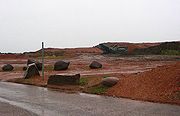

, Scotland
. Originally a small industrial village to the nearby shale
mine and works, it now adjoins the new town
of Livingston
, which was constructed alongside Pumpherston in the late 1960s and quickly grew much larger than its neighbours.
Music
There have been many bands and singers to emerge from Pumpherston. For years they had their very own pipe band until it was engulfed by the name of Livingston. Josie Wood excelled with his band while others such as Route66, The Suspects and Faith rocked their way through the late 70's & early 80's. The latter of the two bands merged to form Lynden Arden in the mid 80's. In 1988 another band Zire arrived on the scene, playing a charity gig for the Lockerbie air disaster in the local Institute Hall. A few members of Zire then merged with two of Lynden Arden to form The Dukla Slam in 1992. The most well known of all these artists from Pumpherston was Kerry McGregor who had success with many ventures including the Eurovision qualifiers and the X Factor as well as acting.Amenities
Pumpherston still has its own primary school, which is shared with near neighbour Uphall Station. For secondary education pupils travel to one of the high schools in Broxburn
or West Calder
.
Pumpherston has a variety of sporting amenities including Pumpherston Golf Club, Pumpherston Bowling Club and Recreation Park, the home of Pumpherston Juniors Football Club (Pumpherston F.C.
).
In 2005 Pumpherston United F.C was formed to provide an opportunity for children from Pumpherston and the surrounding areas to take part in regular sporting activities. In only its third year the youth football club achieved an Access Level Award through West Lothian Council
's Community Sports Club Development Scheme. The certificate awarded to the club confirms that Pumpherston United F.C demonstrates appropriate levels of efficiency in Child Protection, Good Coaching Practice, Club Management and First Aid.
Pumpherston has produced a few footballers who have made the grade through the years. Walter 'Gunner' McWilliams played for Hibernian while Archie Murphy had a spell with Alloa Athletic. Walter's son Derek also played for Hibernian as well as Dundee, Falkirk, Dunfermline, Partick Thistle, Clydebank and Airdrie. Around the same time Steve Pittman played for East Fife, Shrewsbury Town, Dundee and Partick Thistle (alongside Derek) before heading for his birthplace of the U.S.A to turn out for Kansas City Wizards and Fort Lauderdale Strikers among others. He was also capped by his country.
His son Scott is keeping it in the family and is on the books at Hamilton Academicals.
The Famous "Dukla Pumpherston
" football team was purely fictional, having been used by the comedian Tony Roper
, sometime in the 1980s for the Naked Radio show, The name "Dukla Pumpherston" came from a play called "The Broons" held in Pumpherston Scout Hall circa 1982. It was the second play held there written by Scud Broon, the first was a play called "Out for the Count". Along with the play group around that time was their football team Pumpherston All-Stars.
Both plays had their scripts sent to Radio Scotland with a few of Scud's poems sent by Jim McDougall. Many of the poems were read out and a few ideas from the plays were used in other things, including Dukla Pumpherston (Tony Roper added the words 'Sawmill and Tannery' in the 1980's radio show Naked Radio). However, it is now a team playing to raise funds and awareness for various charities.
History
The history Pumpherston, the story of a shale oil villagewas commissioned by BP
and collated and edited by local area historian Sybil Cavanagh. This book acknowledges a previous history by a Mr Vic Armstrong. Both books are out of print as of 2009.
The specific oil shale retort
, invented in 1894 and marking the separation of the oil shale industry
from the coal industry, is named after the village.
Origin of the name
There does not seem to be an unambiguous derivation for the origin of the name.
Various suggestions have been made as to the meaning of the name Pumpherston. One writer suggested it was from 'pamper', a short thickset man; another suggested it was from 'pundler', the official in the middle ages who impounded stray cattle. [A more likely] derivation is from 'ap Humphrey' meaning son of Humphrey.
Pomphray was probably [the name of] one of the Flemish (Belgian) noblemen invited by King David I and his grandson Malcolm IV to settle in Scotland in the twelfth century ... Pomphray would have been granted the lands north of the Almond in return for serving the king in battle ... around the castle built by Pomphray, probably a wooden structure later replaced by a stone building, would have grown up a little settlement and farm to house and feed his adherents and servants - Pomphray's town.
Manu de Pomphray was a Belgian mercenary who was rewarded for his "deeds" by King Malcolm circa 1130-1145
—Sybil Cavanagh et al.
Archaeology
There is evidence of the Roman occupationapproximately two miles north east of Pumpherston - at Roman Camp, near Broxburn
.

